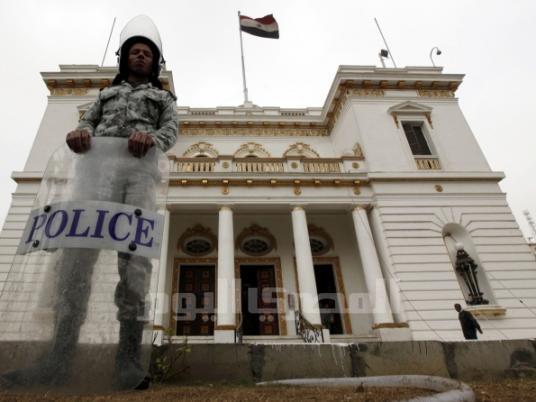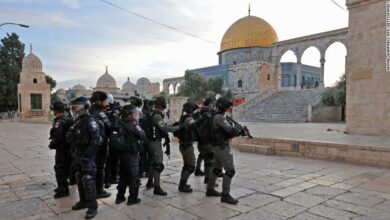
As the political deadlock over the formation of the committee that will write Egypt’s constitution continues, MPs expressed their outrage at the ruling Supreme Council of Armed Forces this week.
People’s Assembly Speaker Saad al-Katatny said that if the SCAF amended the Constitutional Declaration passed in 2011, this would constitute “a violation of Parliament’s powers” because legislation is the sole prerogative of the People’s Assembly.
Anger at the verdict handed down to former President Hosni Mubarak, his two sons and senior Interior Ministry officers seeped into the People’s Assembly from nearby Tahrir Square on Saturday.
MPs were fiercely critical of the ruling, with Katatny saying that a “second revolution” started the moment the verdict was announced.
Hussein Ibrahim, head of the majority Freedom and Justice Party in Parliament, questioned how the judge could say “there is a crime and there isn’t at the same time. Who killed more than 1,000 martyrs and injured 7,000 people?”
Ibrahim alleged that members of the ruling SCAF and current government members have destroyed vital evidence.
In an impassioned address, FJP MP Mohamed al-Beltagy said that Egypt is “before a regime that has shown that it is able to re-establish itself. This will result in prosecution of revolutionaries.”
Beltagy said that the presence of Mubarak’s last Prime Minister Ahmad Shafiq in the presidential election is a “crime against the nation.”
“For the first time in Egypt’s history a People’s Assembly is elected in fair and fraud-free elections. It issues a law which is then trampled all over by an administrative body that doesn’t like the law and so gave the law ‘a holiday,’” he added.
Beltagy refers to the Political Isolation Law which was passed by Parliament and approved by the SCAF but then referred to the Supreme Constitutional Court by the Presidential Elections Commission. On Wednesday, a committee of commissioners to the court advised that the elections commission does not have the judicial status to refer the law to the court.
Wasat MP Essam Sultan said that LE2 million of public money is spent daily on the protection of Shafiq’s house and demanded that the defense minister be summoned to Parliament to justify this. “Twelve other presidential candidates were not given this exceptional treatment,” he said.
“If he is at risk, this isn’t our problem. He should pay out of his own pocket for protection.”
Petroleum Minister Abdullah Ghorab received a rowdy reception when he and other government figures appeared in Parliament to answer questions about the current fuel crisis.
FJP MP Mohamed Abdel-Azim demanded to know the real reasons behind the fuel crisis while FJP MP Bahaa Atteya excoriated the minister’s “absolute failure” in managing the crisis, saying that people are fighting each over fuel at gas stations and the minister is completely unaware of what is going on. He was reprimanded by Katatny for this “personal attack” on the minister but carried on anyway.
Atteya told the Minister that “he is living on another planet.”
Ghorab rejected allegations that the fuel crisis is manufactured to punish the general public, saying that it is an old and recurring problem.
Information Minister Ahmed Anis said that there has been radical change in state media since the revolution, but was lambasted by MPs who said that state media propagates “lies” about the People’s Assembly and its MPs.
FJP MP Mohamed al-Hawary alleged that the media “is intent on spreading lies about Parliament such as their reports on discussion of a law allowing men to have intercourse with their deceased wives. All this is malicious slander. In whose interest is it to tarnish the image of Islamist forces?”
Planning and International Cooperation Minister Fayza Abouelnaga and Finance Minister Momtaz al-Saeed appeared in Parliament this week to discuss the government budget for the coming financial year.
Abouelnaga said that the private sector will play a key role in economic development and that a neoliberal economic policy does not mean that the state will abandon citizens. Abouelnaga promised that the government will send the new budget to the People’s Assembly soon.
In committees, discussions have been ongoing, some amounting to the passing of draft laws.
The Foreign Affairs Committee demanded this week that the Foreign and Finance Ministries submit an explanatory note on the Foreign Ministry’s budget for the 2012-2013 financial year. The committee has previously raised questions about expense and bonus payments received by Foreign Ministry employees.
The Defense and Security Committee has agreed in principle to amendment of the Police Law’s provisions on admittance to the Police Academy. The government amendment proposes that a committee be formed to examine applications to the Academy. The law proposes raises in police officers' salaries.
Saad al-Husseini, head of the Budget and Planning Committee, announced on Tuesday that 500,000 government temporary workers will be made permanent from the beginning of the next month.
The Proposals and Complaints Committee approved amendments to the Prison Law put forward by the head of the Human Rights Committee, Reform and Development Party MP Mohamed Anwar al-Sadat. The amendments concern treatment of prisoners, prison inspections and rights of pregnant prisoners. The committee is also considering a draft law for the establishment of an anti-corruption entity that would be tied to Parliament and responsible for fighting corruption in the government, the public business sector and the private sector.
The Constitutional and Legislative Affairs Committee approved a proposal for a draft law that would restructure the Forensic Medicine Authority and make it autonomous from the Justice Ministry in order to guarantee its independence.




